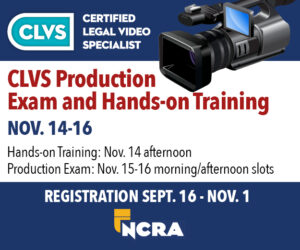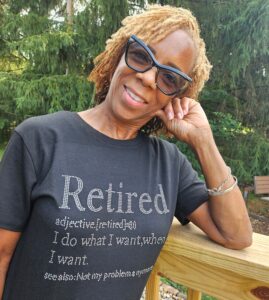The Registered Professional Reporter (RPR) is NCRA’s foundational certification, which tests the essential knowledge and skills for an entry-level reporter. Members of NCRA’s New Professionals Committee who have earned their RPR within the last few years shared why they earned this certification, their strategies for preparing for and passing the exam, and which certification is next on their list.
The value of the RPR
Depending on the state or job, a reporter may need to earn the RPR. For example, Melissa Case, RPR, was aiming for an officialship in Ohio, which required the RPR. Danielle Griffin, RPR, needed to earn it (along with a written test) to practice as a freelancer in Arizona.
Even in states that have a requirement such as a certified shorthand reporter (CSR), earning the RPR has its benefits. For example, some states will accept the RPR in lieu of the CSR. “The RPR requirements are almost identical to my state requirements. It was an easier and quicker process to go through for certification since my state accepts the RPR in order to practice as a reporter,” said Michael Hensley, RPR, a freelancer in Illinois.
Rachel Barkmue, RPR, an official in California, used the RPR to help her prepare for her state’s CSR. “I took the RPR Written Knowledge Test in conjunction with my state’s CSR written exam, so the materials were similar, and I took them both around the same time,” she said.
However, earning the RPR means more than simply fulfilling a set of requirements. Some reporters are looking for a professional or personal boost. “I knew it would open up a lot more doors for me,” said Case. Barkume earned the RPR for “more marketability and my personal goal of getting as many extra letters after my name as possible. I always want to keep striving for something new.”
Mikey McMorran, RPR, a freelancer in California, had earned most of the segments of the RPR as a student but got tripped up on the testimony leg. “Really when it comes down to it, the biggest reason I decided to go after my RPR was for my own reputation among my peers as well as my own reaffirmation that I belong in this profession,” he said. “As someone who has attended many court reporting functions over the years, I don’t think I’ve ever attended one in which the question did not come up from someone, ‘Do you have your RPR?’ Honestly, it was a little bit embarrassing to have to say every time, ‘Oh, I have all of the legs except for one.’”
Finding the right resources
Most of the members of the New Professionals Committee practiced for the RPR on their own using a variety of strategies. Several members used their school’s environment or resources to earn their certification. “I obtained my RPR as part of my schooling program. Once I finished speeds, then I set my sights on the RPR with all of my time and energy resources,” said Hensley.
“Take the RPR while in school or freshly out of school if possible. There is no replacement for that test mentality that you get daily in school. Once you’re working every day, you lose the test mode and it’s very difficult to get back in that mindset while also handling a working calendar,” said Barkume. “I was still in school/less than a year out of school when I took all my legs (I passed one at a time over three testing dates), so I still had the dictation recordings from school, etc. to help me practice at home.”
Griffin used dictation from the Magnum Steno Club — run by Mark Kislingbury, RDR, CRR, a broadcast captioner in Texas — and EV360. “Between EV360 and Magnum Steno Club, the dictation I was practicing was much harder than the actual test, which worked to my advantage when test nerves kicked in,” said Griffin. She explained her strategy of practicing above the normal speed. “For some reason, testing for the RPR made me nervous. I had to make sure I was above the required speeds so that when the test started and my nerves kicked in, I had an extra bit of speed reserved to account for that.” She practiced 30 to 40 percent above her target speed. “The purpose is to envision yourself as if you were sitting in a speed competition, as a competitor, and writing as if you had expert precision,” she said. “If you take that dictation back down to 225 or a new take at 180, 200, or 225, while applying that same mentality, you will achieve your speed faster than you think.”
Several members of the committee found valuable resources through NCRA. Hensley used recordings of previous RPR Exams, saying the real thing felt “like just another day of practice instead of an actual test.” Case used the RPR Study Guide to aid her in preparation. She commented: “the Written Knowledge Test was much harder than I expected.”
While most new professionals practiced solo, a couple mentioned having a community to lean on. “In Arizona, we have an extremely supportive court reporting community. There are many veteran reporters that are able and willing to volunteer their time to help and mentor students,” said Griffin. “I was able to work with Doreen Sutton, RPR, and Kim Portik, RMR, CRR, CRC, CLVS, to help with the RPR Prep classes.” She added: “That was also a great way to meet other students, practice together, and share suggestions.”
McMorran agrees on the value of a strong court-reporting network. “If you surround yourself with the reporters who do the bare minimum in this profession and talk about how certification is so unnecessary or how hard the test is, then it becomes so much harder to get into the right mindset to pass as opposed to being surrounded by people who can reassure you that you can do it because they did it,” he said.
Mastering online skills testing
Some of the new professionals did their RPR entirely online while others had taken legs of the Skills Test prior to the switch from brick-and-mortar testing. Overall, online testing won out as more convenient, although it took some adjustment.
“I took the RPR the last time it was offered at a brick-and-mortar site. The second time I took it, it was offered online. I have stories about the first few attempts trying to log on to take tests for the RPR. I soon found out that I was using a netbook. Once I switched to a laptop computer and not a netbook, I passed my last two tests,” said Griffin.
McMorran also had a learning curve with the technology. “When I first took the online style, I really did not do a great job of practicing with the webcam and didn’t even bother to schedule the proctored practice that we have the ability to do. Big mistake on my part,” he said. “My first attempt using the online method, I had some webcam issues that left me flustered right before the exam. I ended up not passing that attempt and knew it was on me for lack of preparation. I rescheduled another attempt at the exam for a week later so that I could properly prepare from a technology standpoint and ended up passing that following week.”
Both Griffin and McMorran found online testing to be more convenient than being at a brick-and-mortar site. “Online testing is such a great tool to be able to have at our fingertips. As a student, you are no longer having to wait twice a year to test. What a relief!” said Griffin.
McMorran said that even though he was initially intimidated about the concept of online testing, “once I actually put the time in to read everything over and prepare for the use of the webcam, not only did I find the technology side to not be intimidating at all, but it is so much easier than dragging a printer to a testing location.”
What’s the next step?
The new professionals are mixed on whether their next certification goal is the RMR or the CRR.
Griffin is leaning toward the RMR, saying: “I am excited to continue learning and also refining my writing.” Hensley agreed, adding: “I want to have a good grasp on speed so that I can next move into offering realtime.”
Realtime is a big pull. “We have to do realtime at the courthouse,” said Case for why she wants to earn the CRR.
“I’ve taken a handful of realtime job over the last year, but I don’t think there’s anything that would give me more confidence heading into each and every realtime job than seeing those initials after my name,” said McMorran.
“I want the CRR because I will receive a salary increase at my court for realtime certification, and it will make me more marketable in the future for other goals I want to achieve. I’d also like to work towards my CRC for the same reasons,” said Barkume. “Realtime is the most important part of reporting, in my opinion. It is what will save our jobs.”
















